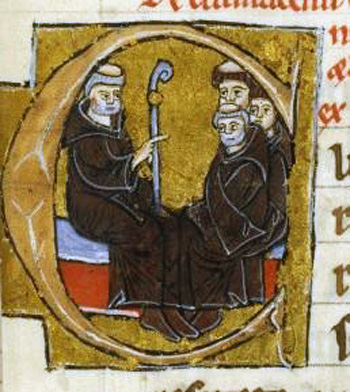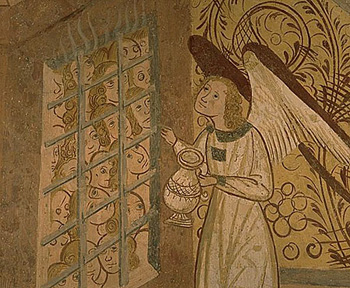Cluny & the Birth of All Souls’ Day
Shortly after the death of the Abbot of Cluny Monastery, St. Odilo (972-1048), the monk Jotsuald reported the following fact in the life of the Saint that he was then writing:
When our monk saw the seas calm, he chatted about one thing and another with this hermit. The man of God asked him what nationality he was, and he answered that he was Aquitanian.
Then, the man of God asked if he knew a monastery which bears the name of Cluny, and the Abbot of this place Odilo.
He answered, "I knew him, indeed, I knew him well, but I would like to know why you are asking me this question."
The other replied: "I am going to tell you, and I beg you to remember what you are about to hear. Not far from where we are, there are places where, by the manifest will of God, a blazing fire spits with the utmost violence. For a fixed length of time the souls of sinners are purged there in various tortures. A host of devils are responsible for renewing these torments constantly: Each day they inflict them new pains and make the suffering more intolerable.
"I have often heard the lamentations of these men, who complain violently. God's mercy in fact allows these condemned souls to be delivered from their pains by the prayers of monks and by alms given to the poor in holy places. Their complaints are addressed above all to the Monastery of Cluny and its Abbot, because they do not pray enough for their suffering souls.
"In the name of God, I beg of you, therefore, if you have the good fortune to regain your home and family, to make known to this monastery what you have heard from my mouth and to exhort the monks to multiply their prayers, vigils and alms for the repose of souls enduring punishment, in order that there might be more joy in Heaven and that the Devil might be vanquished and thwarted."

An Angel brings solace to the poor souls
The holy Father Abbot proposed to all the monasteries that the day after All Saints' Day, the first day of November, the memory of all the faithful should be celebrated everywhere in order to secure the repose of the souls, and that masses, with psalms and alms, be celebrated in public and in private, and that alms be distributed unstintingly to all the poor.
Thus would hard blows be struck at the diabolical enemy and Christians suffering in Gehenna would cherish the hope of divine mercy."
Thus, in the 11th century – probably between 1024 and 1033 – the Monastery of Cluny began commemorating the dead on November 2, the day after All Saints' Day. Thence it spread among the other Orders of the Benedictines and the Carthusians.
The prestige of the Cluny Monastery was such that before long the "Day of the Dead" was being celebrated throughout Christendom.